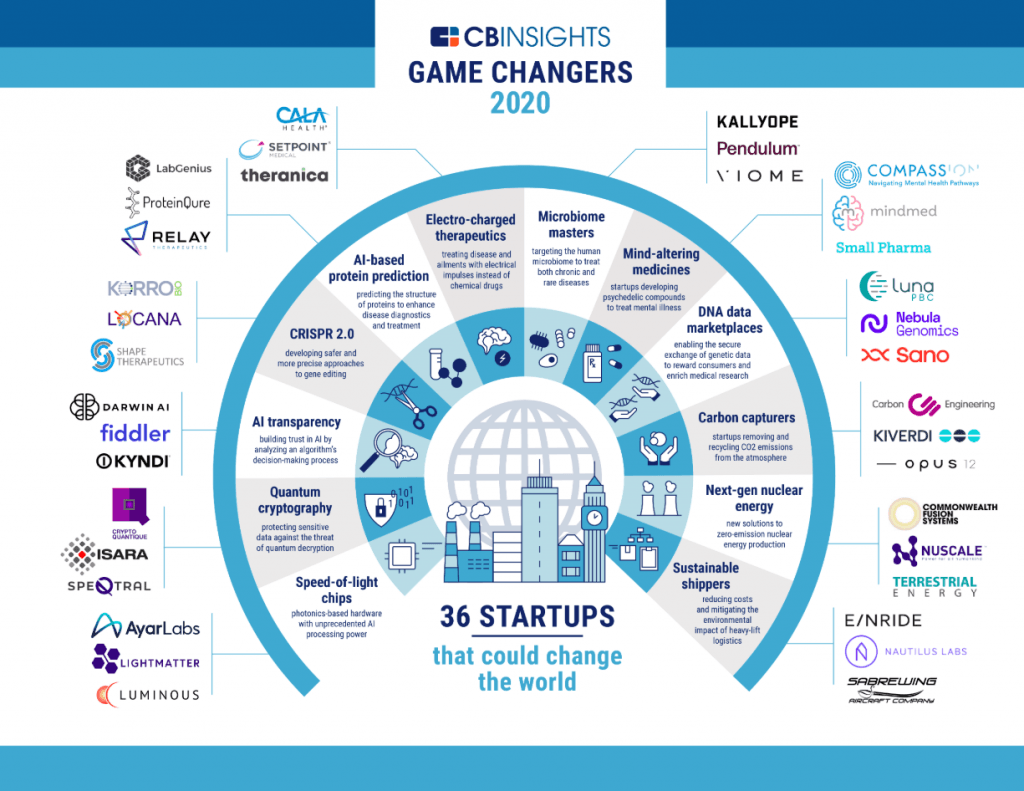5 British Companies Changing The World In 2020 According to CBInsights

Right before the end of the decade, one of our favourite industry intel providers CBInsights published a fascinating report called Game Changers 2020.
The whole report is worth a read, if you have time. They analysed the most promising trends by looking at the bets of high-profile investors, as well as using their News Mentions tool to analyse the momentum of certain technologies and sectors.
They summarised their findings in 12 categories that sound more like science fiction than reality, but that are indeed very real and quite crucial in shaping – literally – the fate of humanity.

Three of the 12 categories have to do with breaking out of the current limitations of computing. These are photonics-based hardware and chips, quantum cryptography and AI transparency.
Six categories are somewhat related to next-generation healthcare technologies, ranging from gene-editing to therapies based on electrical impulses, from using psychedelics to cure mental illness to managing genetic data securely.
Finally, each of the last three categories plays a role in tackling the climate crisis: some start-ups are using technology to remove CO2 from the atmosphere, some aim to develop safer and more sustainable nuclear power, some logistics companies are trying to reduce the economic and environmental costs of shipping goods around the world.
Of the 36 companies (three per category) labelled “Game Changers”, 23 are US-based, 5 are British, 5 are Canadian, and the remaining three are based in Israel, Singapore and Sweden respectively.
CBInsights defines their Game Changers as follows:
“An event, idea, or procedure that effects a significant shift in the current manner of doing or thinking about something.
A newly introduced element or factor that changes an existing situation or activity in a significant way.
Our selected startups are high-momentum companies pioneering technology with the potential to transform society and economies for the better.”
Let’s take a closer look at the five futuristic UK-based companies that have made the list.
Quantum Cryptography: Crypto Quantique
There has been a lot of talk about quantum supremacy at the end of last year, after Google claimed to have achieved it with its quantum processor Sycamore.
In short, quantum supremacy is the demonstration that a quantum device is able to solve a problem that traditional computers cannot solve in a useful amount of time. Although IBM disputed part of Google’s claim, that’s still quite a big deal.
That is because all current cryptography is based on algorithms and problems designed not to be solvable by traditional computers (or supercomputers) in a short enough amount of time. Obviously, if quantum computers can beat that, these encryptions won’t be secure anymore.
This is why several companies are focusing their research on cryptography techniques designed for quantum computers, making sure that when the quantum revolution comes our bank details (and much more sensitive data) is safe.
London-based Crypto Quantique is doing just that, developing hardware and software that combines quantum tunnelling technology with modern cryptography for end-to-end IoT security platforms.
Protein Folding Prediction: LabGenius
The proteins in our bodies are long and complex chained molecules that fold on themselves in complicated structures. These structures are crucial for our understanding of their role in our body, and for the diagnosis and treatment of many diseases that today don’t have a cure.
Demis Hassabis, CEO and co-Founder of DeepMind said:
“Understanding how proteins fold is a longstanding fundamental scientific question that could one day be key to unlocking new treatments for a whole range of diseases – from Alzheimer’s and Parkinson’s to cystic fibrosis and Huntington’s – where misfolded proteins are believed to play a role.”
Artificial Intelligence can help predict complicated 3D structures and aid researchers in their quest to understand and use protein folding to detect and treat diseases.
LabGenius is one of the companies working towards this aim, using a combination of bleeding-edge tech including neural networks, robotics and synthetic biology. Their ML-driven engine dubbed EVA is a smart, robotic platform capable of conducting its own experiments on protein folding and drug synthesis and to critically analyse its findings. LabGenius believes that this is the key to bridge this gap in humans’ understanding of such a complex biological problem.
Mind-Altering Medicines: Compass and Small Pharma
One of the most positive trends of the 2010s was the rise in awareness around mental health and mental illness. This has sparked new research trying to find more effective therapies to treat depression, anxiety and other pathologies. It also shed light on the dangerous side-effects and possible addictive nature of traditional anti-depressants.
A very promising direction towards which research has moved in the past few years is the use of psychedelic compounds to treat this kind of illnesses. These are non-toxic, non-addictive and sometimes only require a single session to be effective.
According to CB Insights, in one study dating back to 2008, patients that were given a high dose of psilocybin (the active compound found in magic mushrooms) for the first time, reported increased well-being and positive behaviour as much as three times more than the control group two months after the session. The most remarkable finding, though, is that the subjects said results stayed consistent even over a year later.
Both Compass and Small Pharma were born with a focus on accelerating the approval of innovative mental health treatments with proven benefits. The first has developed a psilocybin-based drug that is in later-stage testing in both Europe and North America. The latter is working on an anti-depressant based on a derivative of ketamine.
Genetic Data: Sano Genetics
Between 2017 and 2019, the number of people supplying their DNA for medical studies went up by 160%, from about 500 thousand to 1.3 million. This was mostly fuelled by companies distributing DNA-testing kits to develop personalised treatments or to identify genealogical trees. These companies were selling DNA data to third-parties, including pharmaceutical researchers.
There’s nothing wrong with that, DNA data helps researchers develop more advanced drugs and understand genetic diseases. Some customers of these companies, however, did not completely understand the involvement of third-parties in their business models and claimed they had not given consent for their DNA data to be used for such purposes.
This is why companies with the aim of empowering researchers with precious data, while ensuring that users have control over their data are now picking up pace, with a mission to encourage a collaborative approach between researchers and their users.
Cambridge-based Sano Genetics is one of these company. Their mission is all about transparency and rather than promising personalised treatments designed for the users while concealing the privacy implications, they explicitly ask their users to contribute to the future of medicine by sharing their DNA data.
The information available on this page is of a general nature and is not intended to provide specific advice to any individuals or entities. We work hard to ensure this information is accurate at the time of publishing, although there is no guarantee that such information is accurate at the time you read this. We recommend individuals and companies seek professional advice on their circumstances and matters.




